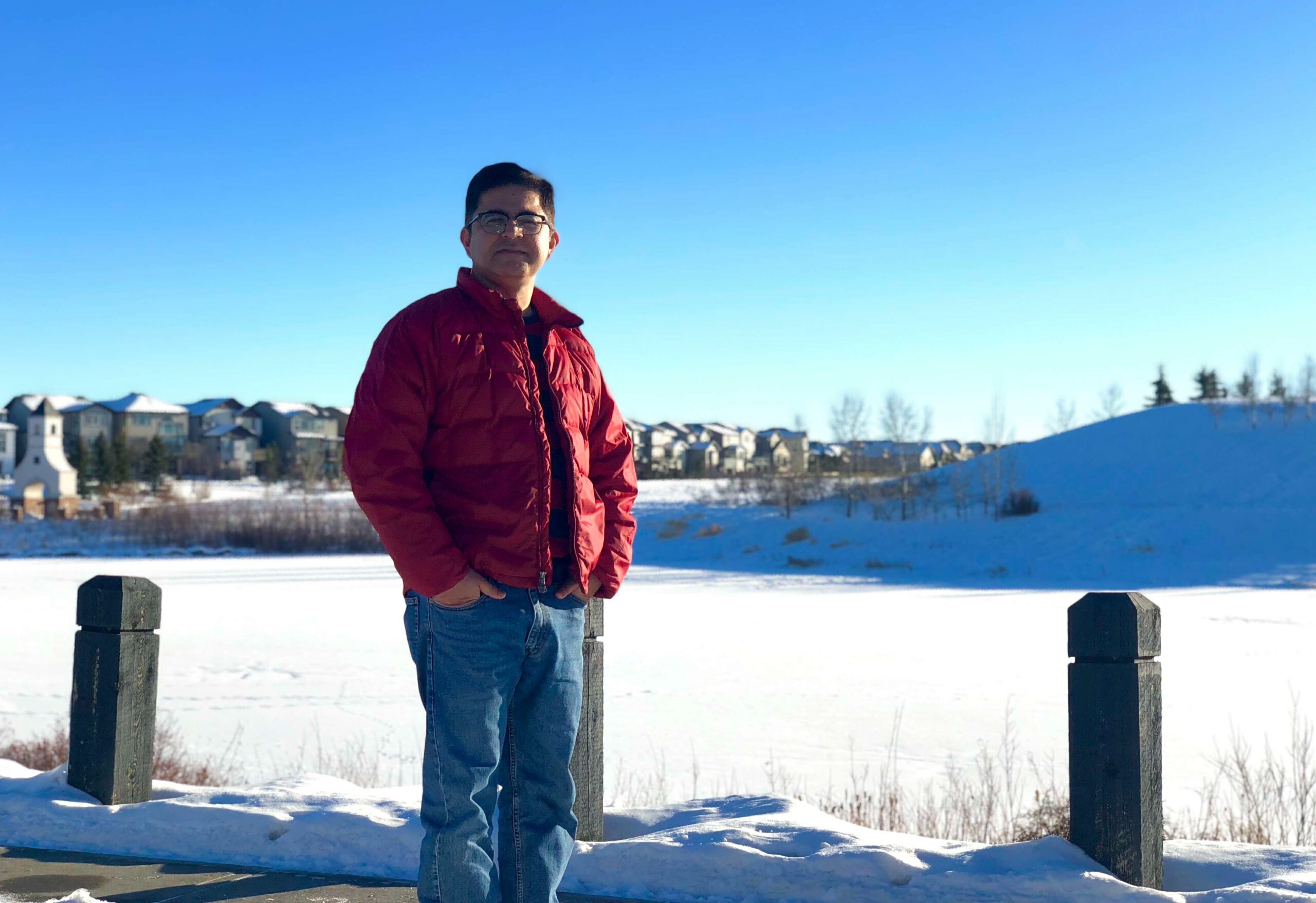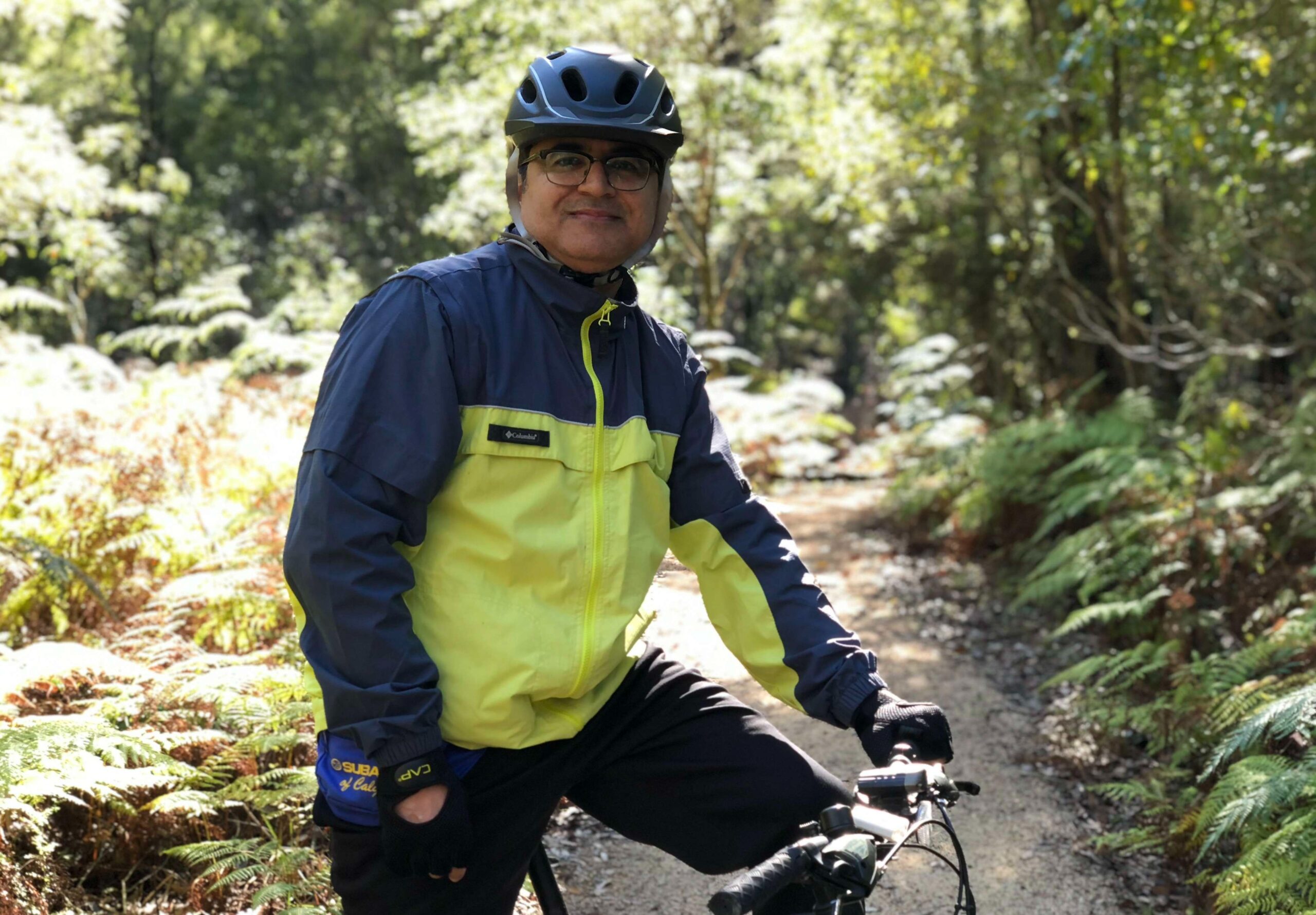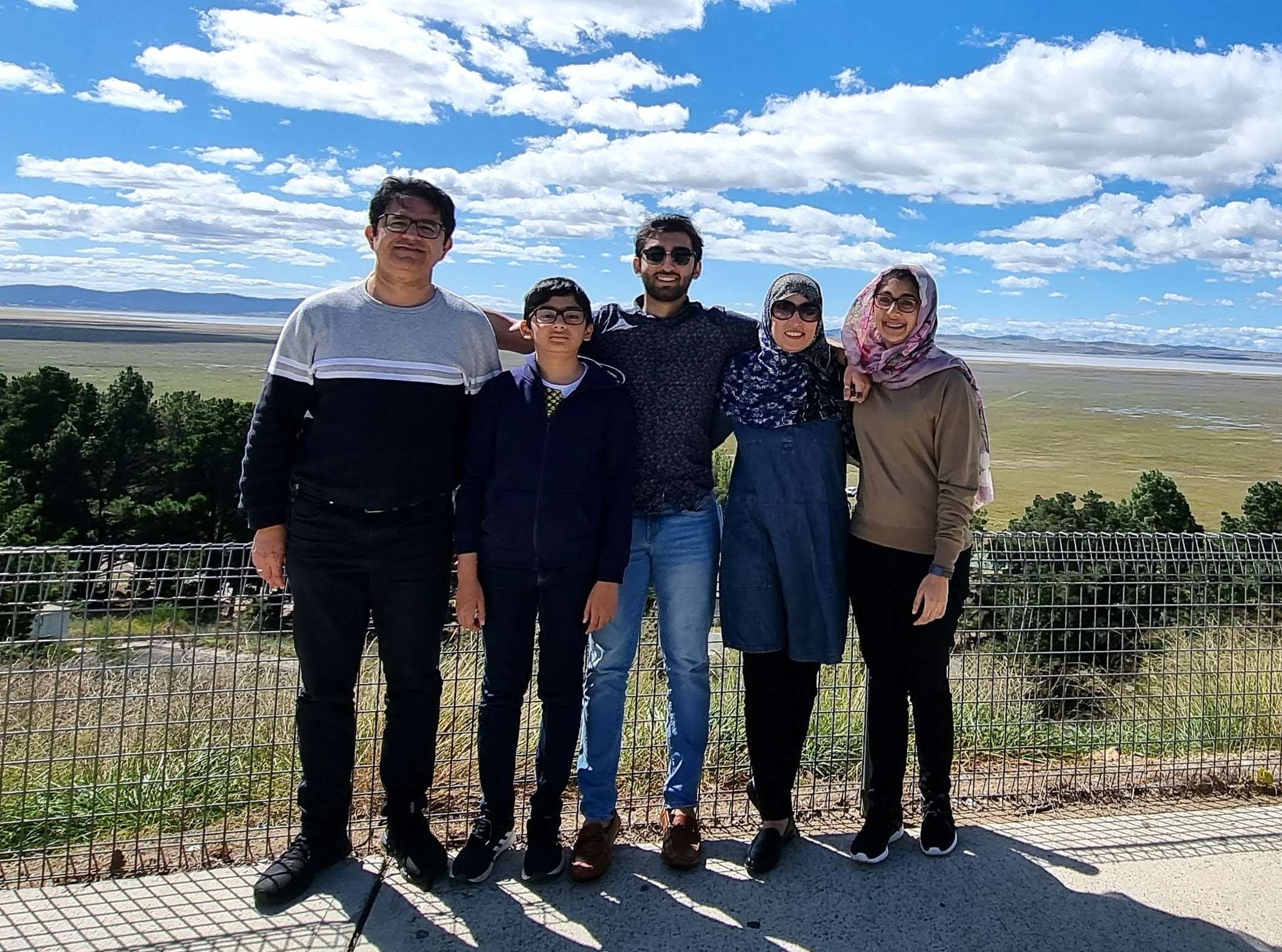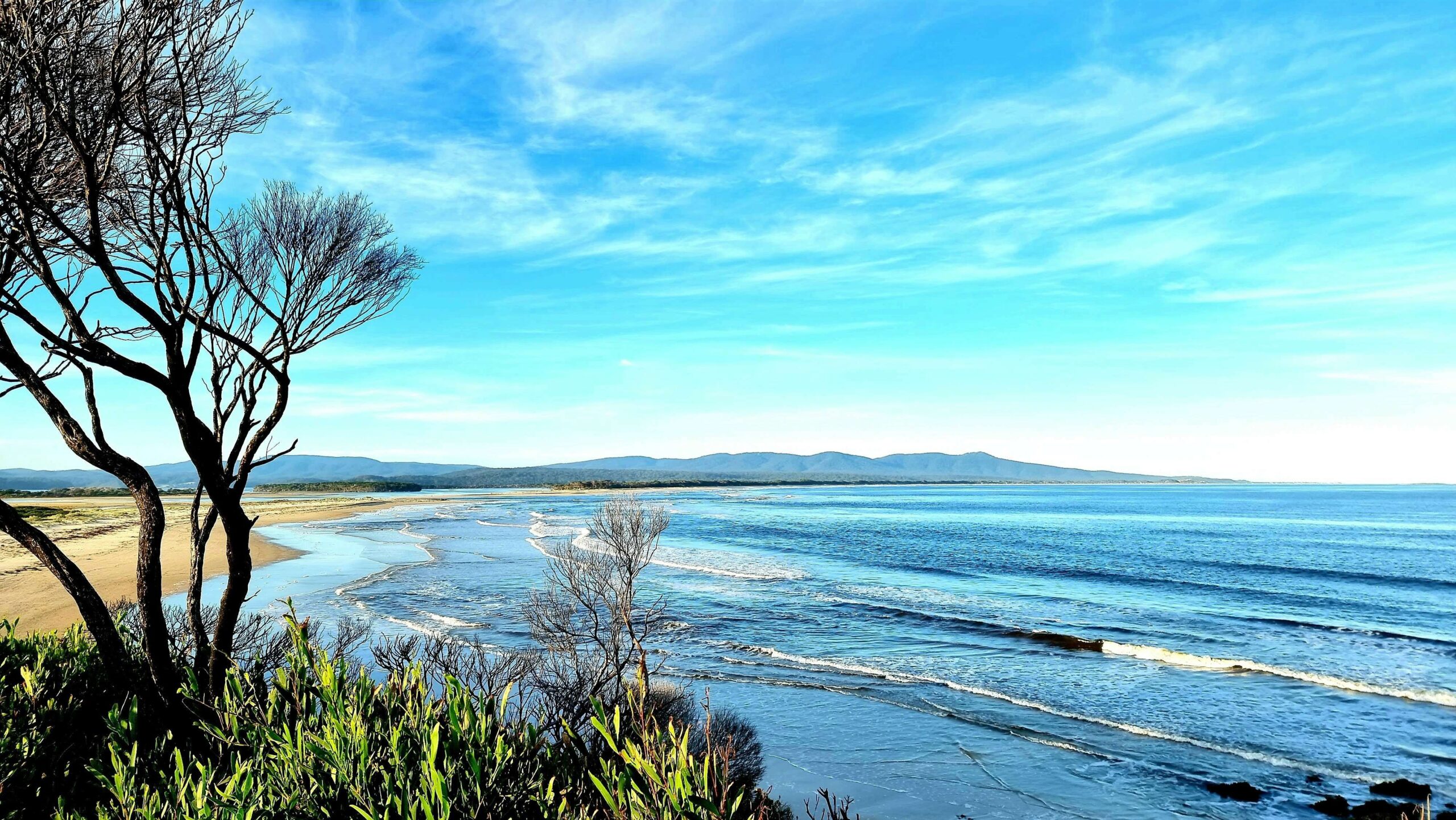Dr Mubashar Sherazi had a successful career in General Surgery – but his ultimate goal was to work in rural General Practice.
After moving from his native Pakistan to Canada, and then to Queensland, he finally found his ‘pot of gold’ working as a GP registrar at Mallacoota, a small fishing village on Victoria’s remote north-east coast. As the first registrar recruited to a rural community under RVTS’s Targeted Recruitment program, Mubashar is passionate about RVTS and the support it provides.
He is also passionate about helping his community – and that has included publishing two books to help the community recover from the devastating bushfires that ripped through the town in December 2019. Earlier this month, he received the RACGP’s Rural GP in Training of the Year Award for 2021 – a perfect way to close off the year in which he also received his FRACGP and FARGP. Mubashar spoke with Patrick Daley.

Mubashar with his RACGP Rural GP in Training of the Year Award for 2021.
I was raised in Pakistan, in a small regional city called Sahiwal, about three hours’ drive from Lahore.
As a child, I was mostly involved in studies and some sports. I used to play badminton and then started squash in high school. I played well and trained a lot.
My father was the first generation of my family to move away from farming. He did a Master of Economics and worked for a bank. But we kept our strong link with our rural background – on weekends and holidays, I used to stay with my grandfather, who was a farmer in a local village.
Initially, I wanted to become an aeronautical engineer, and after Year 10 applied for the Air Force – but when I was working out what I should study in Year 11, I realised that as a doctor I’d be able to work anywhere in Pakistan and help the community.
To start with, I didn’t really think about Rural Medicine, but at medical school I got involved in volunteer rural medical programs, including one that aimed to eradicate polio in Pakistan.
I completed my GP and General Surgery trainings in Lahore after graduating. I then moved to my hometown of Sahiwal and worked in a government hospital, while also running my own General Practice part-time.
I also undertook some volunteer medical work in my hometown and the communities around it, doing home visits and outreach ‘camps’. That was the moment I knew I wanted to become a rural GP.
Why did you decide to move to Canada, and how did you find that experience?
Moving to Canada was very difficult to start with.
My goal was to get into General Practice via the Family Medicine residency program there.
Most of my friends and colleagues said there were not many training positions for international medical graduates in Canada, and that most IMGs ended up doing odd jobs.
That was a bit disheartening, but I like a challenge, so I decided I’d do the Canadian qualifying exams and if that didn’t go well my family and I would go back to Pakistan.
In the shortest possible period, I completed the Licentiate of the Medical Council of Canada and passed the National Assessment Collaboration OSCE with good scores. I then applied to the Family Medicine program and got multiple interviews, but didn’t get selected.
Consequently, I also applied for a General Surgery job and got that out of hundreds of applicants. I started working in General Surgery in Alberta. Everyone told me that now I was in the system it would be easy to get a Family Medicine job – but again in 2015 I was not selected for the Family Medicine program, despite getting interviews.
That same year, I passed the MRCGP UK (International) Examinations. With a well-recognised GP degree along with Canadian healthcare experience, I put in another application to the Family Medicine residency program. Again, I was invited for interviews but not selected.
That was the most disheartening moment, and I felt very isolated.
But I never lost hope. I’m always very motivated to move forward, and that carried me all the way to start a new life in Australia.

How did you end up coming to Australia?
One of my friends is a doctor over here. He told me that, in Australia, I could apply and try to get a job either in a hospital or in General Practice. I put in my first application for a registrar position in Emergency Medicine – this was accepted and I was sent the letter of offer.
It was a big decision. Almost anyone I talked to would say “You are well set up in Canada, why would you leave to start all over again?”
But I took that chance and moved to Queensland in 2017. I worked for the next 14 months in the Emergency Department at Mackay Base Hospital.
How did it feel when you first arrived in Australia?
Everyone was so supportive here, it really felt like home.
For a start, the weather was so good! The temperature in Calgary had been -27 and when I landed in Brisbane it was +31…and the beaches were so beautiful.
I started doing some bike riding and playing badminton, and completed my first book on clinical examinations. I was really enjoying life here.
Soon after I started working in Mackay, Cyclone Debbie came along and hit Queensland badly. There were only a few doctors who could provide cover during the cyclone period and I was one of them. I worked throughout that crisis and got to know everyone.
I really enjoyed my time in the ED with the lovely people working around me. I also completed my Certificate of Emergency Medicine.
They wanted me to stay working at the ED at Mackay, and offered further training opportunities in Emergency Medicine.
I was very happy there – and I will never forget the support I got from Mackay Base Hospital – but I really had my sights set on working as a rural GP.
Lahore, Toronto and Calgary had been big cities to live in, and I missed the things I used to do in the smaller towns in Pakistan. My wife and I had always wanted to go rural, and have a big property with a veggie garden and pets, but we hadn’t had a chance to do that.

How did Mallacoota come about?
I decided to attend the GP17 conference in Sydney, in October 2017.
As luck would have it, I was standing at one of the exhibition booths, and someone said to me “You look lost”.
I said “I’m not lost, I’m just searching for something”.
He asked what I was searching for, and I replied “A rural job”.
He took me to the Mallacoota Doctor Search booth. This community group was trying to recruit another doctor to Mallacoota to help the town’s solo GP, Dr Sara Renwick-Lau.
I told them that I wanted to go rural, but I also wanted to train for my FRACGP.
So they took me to the RVTS stand and I had an initial chat with the RVTS representatives there.
We spoke a few times after that, but within three days I had flown back to Canada – they thought I’d left the country, but I’d gone back to see my family!
In December 2017, Robin Bryant – one of the local people involved in Mallacoota Doctor Search – came to Calgary on a ski trip and he visited my family. He invited me to visit Mallacoota to have a look before signing up.
In February 2018, I came to Mallacoota and met the local people. They showed me the beaches, the bushwalking, the wildlife, and they were so open and supportive. I moved to Mallacoota in May 2018 and my family moved there in July the same year. Once I was in Mallacoota, I commenced my training on the RVTS pathway.
How did you find the transition from General Surgery into General Practice?
Going from General Surgery in Canada to Emergency Medicine in Mackay was not a big deal, but going into General Practice at Mallacoota was quite difficult – mainly because I was not familiar with a lot of the guidelines, and the treatment plans were a bit different.
I also needed to take off my surgical shoes because now I was a pure GP!
I couldn’t remove anyone’s gall bladder or appendix, so I found it strange saying to patients “I need to refer you to a surgeon”.
Also, having worked in the hospital system, I wasn’t used to the delay in getting results on patient scans and blood tests.
If I want to get an x-ray done here, my patient has to do a three hour round-trip for it, and I get the results the next day.
In Mallacoota, bloods are only collected three mornings a week, so after that you are on your own and using your clinical judgement. Either you have to treat the patient or send them to the nearest ED – which means a two-hour drive to Bega (in NSW) or, during lockdown, a three hour drive to Bairnsdale (in Victoria). So it’s a big responsibility, particularly if ambulances or air retrievals may be required.

How did you find the support from RVTS during your time as a registrar?
I had excellent support from everyone involved – from the wider RVTS family and especially my RVTS supervisor, Dr Sarah Willmot from Bairnsdale. Sarah has been fantastic – she has always been there for me, and I have called her regularly for advice.
I was also so blessed to work and get guidance from Dr Sara Renwick-Lau, who is the practice principal at Mallacoota Medical Centre. When I first decided to move here, I said to Sara that I needed to know she would always be there for me. And she has been. She’s one of the best doctors I have met – she is a very good teacher, and we have been able to start a lot of great projects together, including a nurse-led teen health clinic and a cardiac and pulmonary rehab clinic.
I have never seen frowns on either of their faces!
I also found the RVTS webinars, workshops, online portal and boot camps were a great help for my exam preparation and daily General Practice work.
When I started my RVTS training, I was a bit hesitant but after attending the first workshop and meeting the RVTS team in person I realised that RVTS is like family – you have access to help and support from anyone at any time.
Why did you get involved as a Registrar Liaison Officer (RLO) at RVTS?
I wanted to help other registrars. I felt that at times in Pakistan and Canada I needed help too, but I didn’t get much.
Most of the registrars at RVTS are international medical graduates, and I felt that with the things I had learned in my training journey, I could be helping others.
That was the best part of the role. I also liked the RLO meetings that we had regularly with Pat Giddings (RVTS CEO) and Ronda Gurney (now RVTS’s Director of Training) – we could discuss what was going on, give registrar feedback, and discuss any problems and how to solve them. Everyone was very open and always listened.
I finish up as an RLO this month and I’m very sad about it!
But I’ve had a great journey at RVTS, and now I have two fellowships – my FRACGP and FARGP – under my belt.
I’m planning to stay on with RVTS as a Rural Medical Educator and GP Supervisor. I want to continue my commitment with RVTS.
I tell those registrars I meet that, if you like rural practice and want to stay in one place, RVTS is the organisation for you.

Tell me about the bushfires that hit Mallacoota
The bushfires started in December 2019, and our entire family (me, my wife and our three children) had to evacuate. We could not get back immediately after the fires had passed because the roads were still closed, so we lived for six weeks in various locations across NSW, the ACT and Victoria. Our oldest son, who is studying in Canada, had only arrived in Mallacoota the day before the fires started. We took him to Canberra and left him there in order for him to make his return flight to Canada.
One of my FRACGP exams was on 7 February 2020 – I was given an option to withdraw due to exceptional circumstances, but I decided to take the exam in Melbourne and later I passed it.
RVTS really helped me through this trying time.
Pat Giddings and Jane Delaney were the first few people to call me when we had to evacuate from Mallacoota, and I’ll always really appreciate that. It was the most traumatic event in my whole life. We were forced to leave virtually everything behind, but RVTS was there during that whole period for us.
In the midst of all your work and study, you have since published two books on Mallacoota’s bushfires…
That’s right! The first book came into my mind when I was driving back from Melbourne to Mallacoota after the fires, with only my younger son’s three budgies for company.
I realised that many people outside Mallacoota didn’t have a clue as to what had happened here, so I decided to compile a book and include my story. I also invited the Mallacoota locals to contribute their stories – those who evacuated, lost their houses, stayed to fight the fires, or had taken refuge in the ocean and the lake. My son from Canada also wrote his story, because the experience had been so traumatic for him.
Writing the book helped me with my own mental health – I was seeing people every day who were devastated by the fires, and I knew the book would help them and me. We sold 2000 copies of the book, and all the proceeds went to the local emergency services.
One year after the bushfires, I organised the publication of a recovery book. Most of the original contributors were happy to get involved and provide an update on their story. We published that book about three months ago.
Was there a significant healthcare load at the practice following the fires?
The mental health load was very significant. Together with Mallacoota’s Community Health Infrastructure and Resilience Fund (CHIRF), our practice organised three psychologists to come here, and they were booked out for the whole month.
Some locals were also affected physically – for example, heart problems, lung issues and asthma from the smoke. Most of that has diminished now, although some people still require mental health support.
What does a typical day at your practice look like?
There is no hospital here and no nursing home, but because it’s a rural practice we have a spectrum of presentations. Yesterday I attended an abalone diver with a laceration that I had to stitch, so I still get to do some Emergency Medicine and I’m enjoying that.
There are many retirees in Mallacoota so we help them with chronic disease management plans, and we do a lot of preventive health work. I have really enjoyed this. Having worked in Emergency Medicine, I didn’t expect to like that aspect of the work, but I have.
And working as a rural GP, you need to be prepared for anything that comes through the door. With 30 to 40% of the population here over 65 years, we have a significant number of age related issues like falls, shortness of breath and chest pain presentations.
In recent months we have been doing lots of COVID vaccinations, COVID swabbing, and COVID counselling. We have a vaccination rate in our area of about 95%, which is great.
I recently published a video on my YouTube channel, ‘A day in life of a rural GP’.

Has the cultural difference been difficult for you in Mallacoota?
We are the only Pakistani people living here so sometimes that can be lonely, but the local people are so open and helpful that makes a big difference.
And while there’s no Indian restaurant here, the owner of the local Chinese restaurant knows what food restrictions we have, so ordering out is easy – that’s a great part about living in a small town!
I have also found a badminton court at Mallacoota, so I play twice a week. I’m too old to play for the Australian team [laughs] but I’m really enjoying playing badminton again.
And because Mallacoota is so beautiful, I have really got into photography. I have taken a huge number of photos and I put at least one on my Facebook and Instagram pages each day. I recently also started taking photos at night – there’s a group here that does stargazing, so that type of photography is something I want to learn more about.
We have bought a property here now, and we have some animals, veggies and a lot of parrots who come and visit us, so we are really enjoying the rural life.
Congratulations on receiving the RACGP Award!
What was your reaction?
It really meant a lot to me! The past three years have been incredibly busy, stressful and a big adventure, so reaching this point I feel very blessed and honoured. I’m a very motivated person anyway, but this will motivate me even more.

Follow Mubashar on social media:
Instagram @dr.mubashar.sherazi
Facebook @mhsherazi5
YouTube Dr. Mubashar Sherazi
Find more information on Mubashar’s Mallacoota books:
Mallacoota’s Memoirs of Recovery
Find more information on Mubashar’s clinical textbook:




